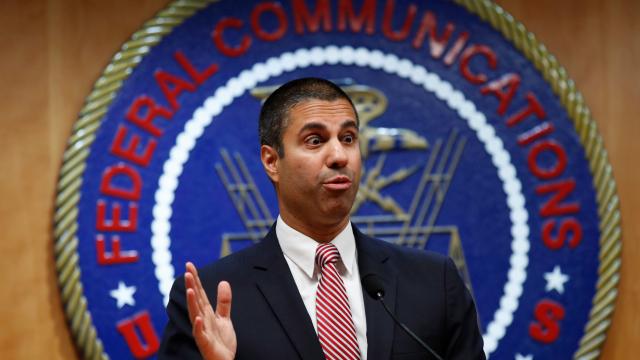The US Federal Communications Commission’s revocation of Barack Obama-era net neutrality rules (misleadingly billed as Restoring Internet Freedom Order) starts going into effect today. But net neutrality isn’t dead – yet.
FCC chair Ajit Pai. Photo: AP
The Republican-controlled FCC, which is chaired by Verizon flack Ajit Pai, passed the order in December with an “effective date” of April 23. But as flagged by the Electronic Frontier Foundation, a nonprofit which opposed abandoning the 2015 rules, Monday was actually just the date that a few small “cosmetic” changes were made official. Instead, the bulk of the order awaits further approval by the White House, meaning internet service providers can’t start to make changes just yet:
On the Federal Register’s website – which is the official daily journal of the United States Federal Government and publishes all proposed and adopted rules, the so-called “Restoring Internet Freedom Order” has an “effective date” of April 23. But that only applies to a few cosmetic changes. The majority of the rules governing the Internet remain the same – the prohibitions on blocking, throttling, and paid prioritisation – remain.
Before the FCC’s end to those protections can take effect, the Office of Management and Budget has to approve the new order, which it hasn’t done. Once that happens, we’ll get another notice in the Federal Register. And that’s when we’ll know for sure when the ISPs will be able to legally start changing their actions.
To be clear, this is just a procedural barrier – and there’s been absolutely zero indication that Donald Trump’s big business-friendly administration will quash the order, which was a huge win for ISPs.
As CNET noted, once the Office of Management and Budget approves the move, that will start a new waiting and public comment period before the new rules go into effect. This new system likely won’t go into effect until at least late May or June, per the Register.
Among other things, the new rules would reclassify internet provision as a Title I instead of Title II information service, which would allow ISPs to implement paid prioritisation programs, as well as block or throttle content from competitors or just about anyone they wager is using too much bandwidth.
Broadband providers will mostly cease to be regulated by the FCC, and thereby be bound only by their own promises (the FCC cleverly passed most of its authority to penalise ISPs that lie to customers to the Federal Trade Commission, a separate agency ill-equipped to handle telecom issues).
Broadband providers aren’t likely to immediately start forcing customers into 1990s AOL-style walled gardens unless they pay extra – though really, who knows – but the end result for consumers will likely be higher costs, slower speeds, and less competition for both ISPs and internet giants who can easily afford to pay whatever tolls are asked of them.
As The New York Times noted, customers have already had a preview of that reality via the near-monopolisation of internet use and infrastructure by a handful of massive internet firms and service providers.
The imposition of the new rules is still all but a certainty. But there’s still time for Congress to intervene, big tech companies and 23 states attorneys general are filing lawsuits, and a number of US states are taking other action to pressure ISPs into honouring their promises not to block or throttle content.
Then there’s the possibility that we could see a major change in who controls Congress by the end of this year, limiting ISP’s time frames to screw over their customers. This round may have ended badly for the open web, but that doesn’t mean the fight is over.
[EFF]
